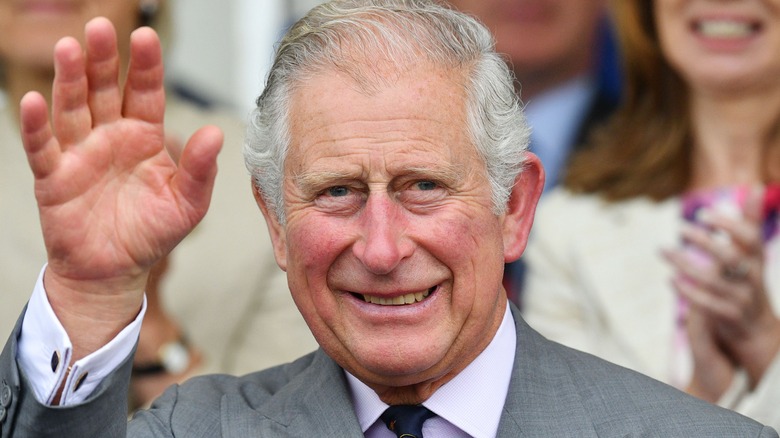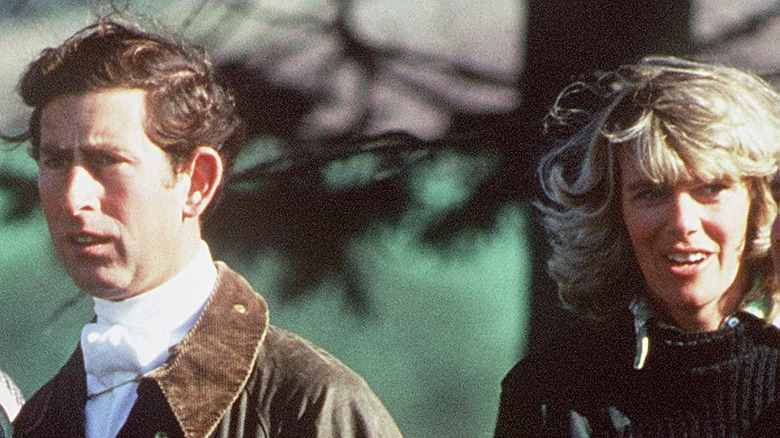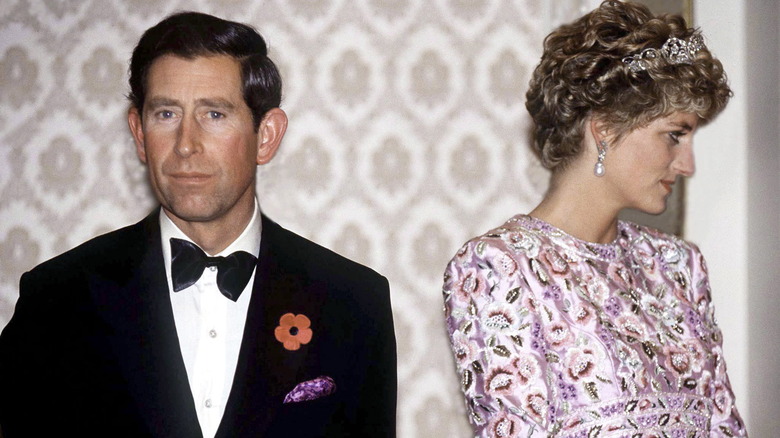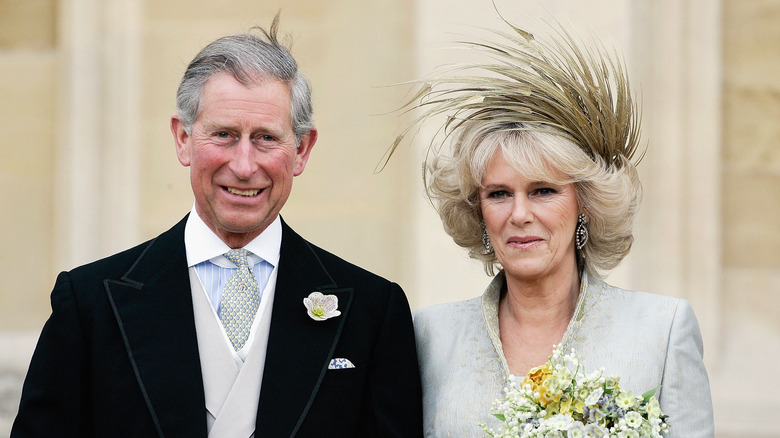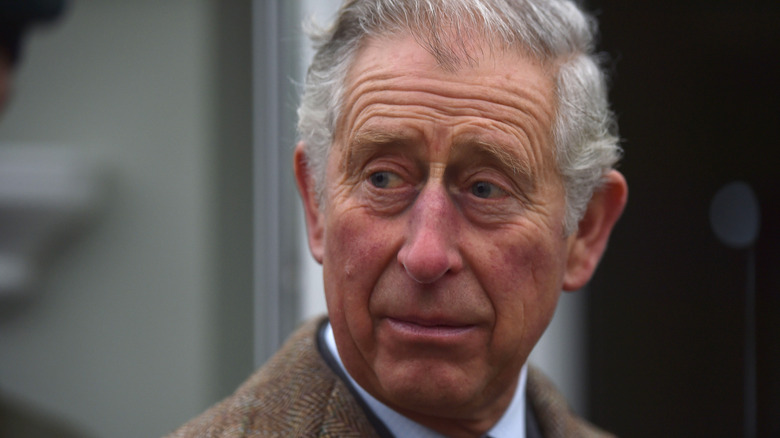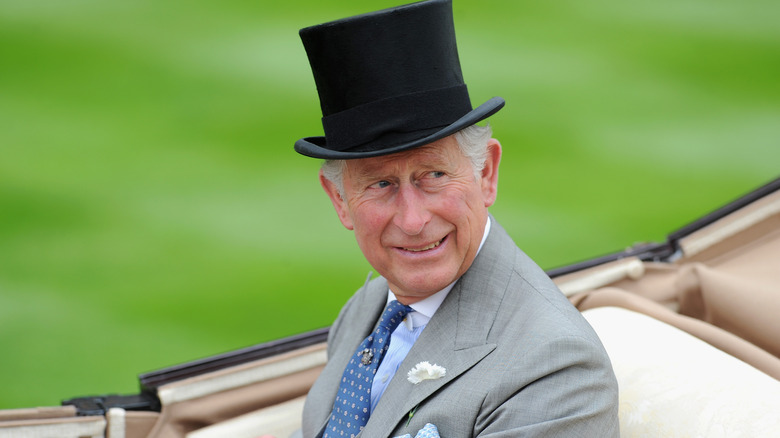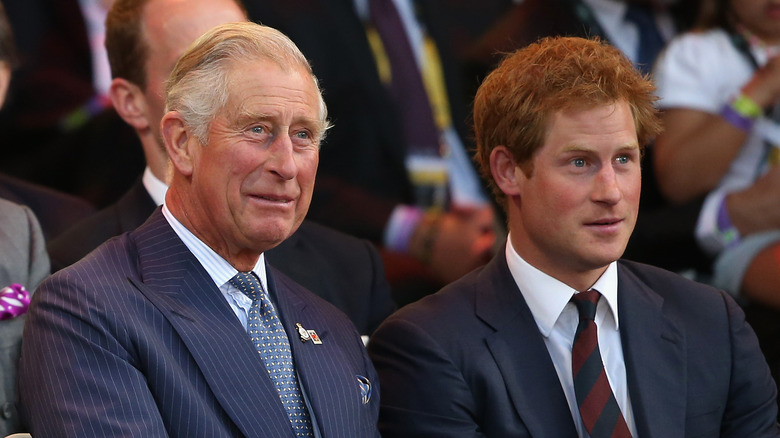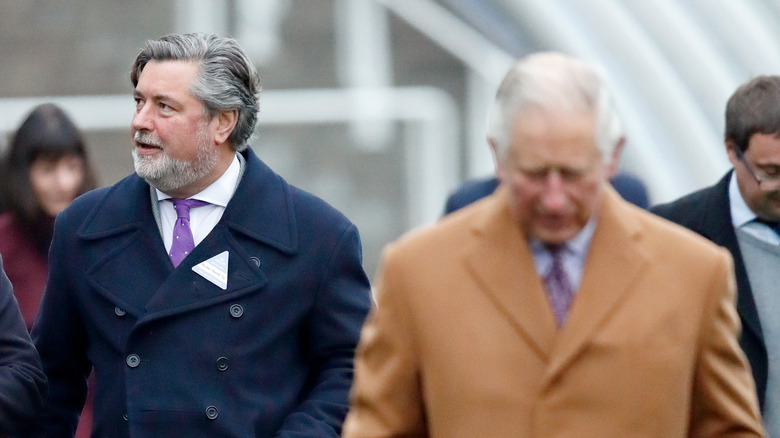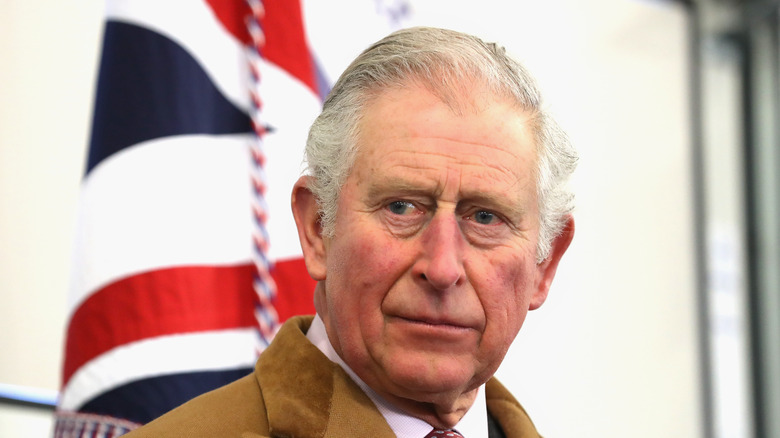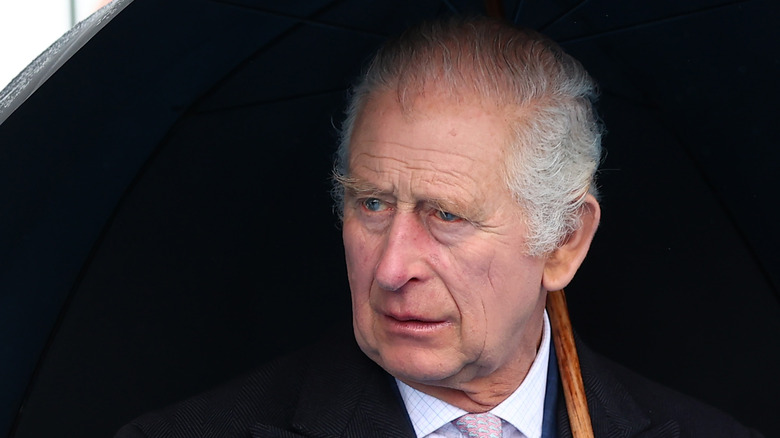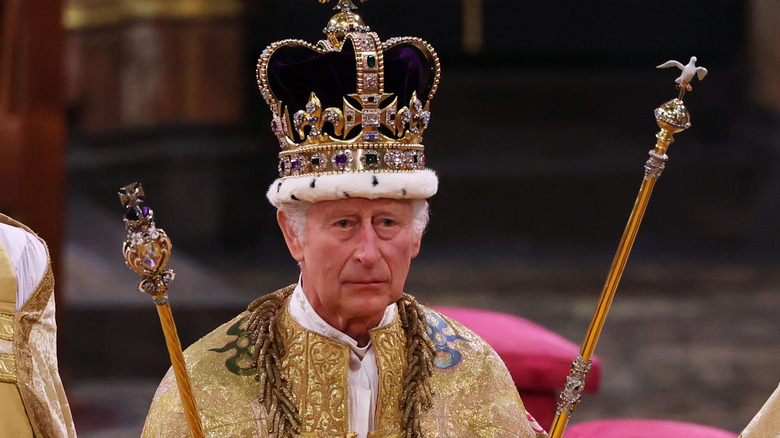King Charles' Most Memorable Scandals
Coronated on May 6, 2023, King Charles III assumed the throne of England after the seven-decade reign of his mother, the late Queen Elizabeth II. Unlike Elizabeth, whose coronation came at age 25, Charles was well into his 70s when he took over the family business — not exactly what anyone would describe as the prime of life.
Thanks to his mother's longevity, royal watchers witnessed Charles' evolution over the decades as his life unfolded under the spotlight, his every public utterance dissected in the media. During those years, Charles celebrated some achievements — the formation of numerous charities, including his Prince's Trust, and his early adoption of environmentalism. Yet there have also been occasions when Charles has been tainted by scandal, and there have been a few. Some of these took place so long ago that the media moved on, focusing instead on the foibles and follies of his sons; Prince Harry, in fact, remains something of a perpetual headline machine for the British press, and the Duke of Sussex has certainly given Fleet Street plenty of ammunition with his controversial Netflix documentary series and blockbuster memoir "Spare." Credit Netflix drama "The Crown" for resurrecting some of Charles' vintage scandals, reminding viewers of how his fairytale wedding to Princess Diana led to a doomed marriage bursting with dirty laundry and sordid rumors.
Now that he's finally wearing the crown, there's no better time than the present for a regal rundown of King Charles' most memorable scandals.
Charles' infamous 'tampongate' scandal
In the pantheon of royal scandals, one looms larger than all others. Hilariously dubbed "tampongate" by the British press, the scandal centered around a private and shockingly intimate telephone conversation between then-Prince Charles and then-mistress Camilla Parker Bowles while both were married to other people. Covertly recorded in 1989, the chat was published by British tabloid the People in 1993, subsequently revealed to have been obtained via illegal phone tapping.
According to a full transcript published in The Sun, Charles and Camilla lamented not being able to spend more time together. "I'll just live inside your trousers or something," Charles jested, with Camilla jokingly suggesting reincarnation. "Oh, you're going to come back as a pair of knickers," she quipped. "Or, God forbid, a Tampax. Just my luck!" Charles responded, adding, "My luck to be chucked down a lavatory and go on and on forever swirling round on the top, never going down."
The cringeworthy conversation was a massive embarrassment for Buckingham Palace. In Ken Wharfe's book, "Guarding Diana: Protecting The Princess Around The World," the former personal protection officer for Princess Diana recalled how severely the scandal impacted the royal family, eroding the foundations of the monarchy itself. "The backlash was savage," Wharfe wrote. "Establishment figures normally loyal to the future king and country were appalled, and some questioned the prince's suitability to rule." While the furor eventually died down, it was reignited in 2022 when the incident was dramatically re-enacted in Netflix's "The Crown."
Charles confessed his infidelity
Having separated from Diana in 1992, Charles was still stinging from "tampongate" when he was interviewed for "Charles: The Private Man, the Public Role," a 1994 documentary to mark the 25th anniversary of his investiture as Prince of Wales. At one point in the documentary, Charles is asked if he intended to be faithful to Diana. "Yes, absolutely," he responded (via The New York Times). He was then asked whether he'd managed to live up to that intention. "Yes," Charles answered, taking a brief pause and then adding, "Until it became irretrievably broken down, us both having tried."
Subtle as it was, this marked Charles' first public admission of infidelity. As the Los Angeles Times reported, the result was a fierce debate among British religious leaders about whether this should disqualify him from his future role as head of the Church of England.
In any case, the whole incident wound up sparking one of the most memorable moments in the legend of Princess Diana. The same night the documentary aired, she attended a Vanity Fair gala attired in a short, low-cut, sexy black gown that came to be known as the "revenge dress." "She decided that she was going to fight back, and she decided that she would choose a dress that she had previously rejected as being a little too much," William Ivey Long, costume designer for Broadway musical "Diana," told People. "And she would put that on and go out on the town."
His marriage to Camilla broke a royal taboo
More than two decades after separating from Princess Diana, Charles married Camilla Parker-Bowles. Given that both were divorced, and had been cheating on their respective spouses for years, this presented another scandal for the House of Windsor. Divorce has long been a sticky subject for the British royals — Henry VIII, in fact, created his own church for the sole purpose of divorcing his first wife, and went to even more extreme measures to rid himself of subsequent spouses. Even by the 20th century, remarrying after divorce simply wasn't done. "Historically the Church of England's position was that divorce was okay, but remarriage was not," history scholar Arianne Chernock explained to History.
Not only was the notion of a divorced future king marrying a divorcée unseemly, it cannot be understated how disliked Camilla was by the British public, characterized as the home-wrecker who broke up Chuck and Di.
In 2002, the Church of England changed its rules about remarrying after divorce, clearing the way for Charles and Camilla to tie the knot in 2005. The marriage marked a crucial stage in a largely successful public relations campaign to rehabilitate Camilla's image, a concerted effort that had been given the code name Operation PB (Parker Bowles). It took a few years, but those efforts paid off, leading much of the British public to feel the woman who had once been England's most reviled person could someday be its queen.
He was accused of influencing the British government with his 'black spider memos'
While "black spider memos" might sound like the title of a John le Carré spy novel, it was actually the term the press gave to 27 letters that Charles had sent to British Prime Minister Tony Blair and various government officials during 2004 and 2005. Obtained by The Guardian in 2015 after a decade-long legal battle, Charles' letters urged the government to take action on a wide swath of issues, ranging from the war in Iraq, to ordering a badger cull to prevent the spread of bovine tuberculosis, to regulatory issues regarding herbal remedies (Charles has long been an enthusiastic supporter of homeopathic medicine).
The release of the memos proved embarrassing to both the government and the crown, given that a British monarch is constitutionally bound to steer clear of politics. In arguing against making the memos public, Britain's then-attorney general, Dominic Grieve, implied the problem wasn't that Charles had breached royal protocol by attempting to influence governmental decisions, but that publicizing those attempts could harm his eventual reign as king. "Any such perception would be seriously damaging to his role as future Monarch," Grieve wrote, "because if he forfeits his position of political neutrality as heir to the throne, he cannot easily recover it when he is king" (via Policy Options).
By the way, "black spider memos" isn't nearly as sinister a moniker as it may seem; the term was coined to describe Charles' spider-like handwriting.
Charles' support of homeopathic medicine was slammed for being 'anti-science'
Homeopathic medicine — based on the premise that the body can heal itself, with the assistance of diluted forms of various herbs, minerals, and plants — remains controversial within the medical community. That's particularly true in the United Kingdom; in 2013, the British government's chief medical officer, Dame Sally Davies, publicly dismissed homeopathy as "rubbish," per The Telegraph, after a 2010 report from the government's Science and Technology Committee found that homeopathy had no basis in science, and any effectiveness in treatment could be explained by the placebo effect.
Charles, however, has long been a proponent of homeopathy, a personal passion that stirred up scandal when he became patron of the Faculty of Homeopathy in 2019. His patronage earned an instant rebuke from the Good Thinking Society, a nonprofit that promotes science and had a history of campaigning against homeopathy. "This news is sadly no surprise, given how routinely Prince Charles has used his royal platform to advocate for an anti-science position when it comes to homeopathy," the group said in a statement published on its website, "but it is obscene to think that the U.K.'s next head of state believes this is an appropriate issue to use his considerable public profile to promote."
At the time, a royal spokesperson defended Charles' support of homeopathy, telling CNN that he "believes that safe and effective, complementary medicine can play an important role in healthcare systems."
Harry accused Charles of poor parenting
Prince Charles has long been criticized for being aloof and out of touch, so it wasn't particularly surprising when his youngest son, Prince Harry, described his parenting in similar terms. "He'd always given an air of not being quite ready for parenthood: the responsibilities, the patience, the time," Harry said of his father during a 2023 British television interview with journalist Tom Bradby, as reported by the Independent. "Even he, though a proud man, would have admitted as much. But single parenthood? Pa was never made for that. To be fair, he tried."
During the television broadcast, Harry read a passage from his memoir, "Spare," in which he recounted opening up to Charles about the mental health struggles he had been experiencing. "I gave him the particulars, told him story after story," Harry wrote. At one point, Harry recalled his father admitting to him, "I suppose it's my fault. I should have got you the help you needed years ago."
That father-son relationship chilled considerably after Harry and wife Meghan Markle's decision to step away from their roles as working royals. In the Duke and Duchess of Sussex's 2021 interview with Oprah Winfrey (via Insider), Harry alleged that Charles had stopped taking his calls in the wake of what the British press dubbed "Megxit." Harry also complained that he and Meghan had been cut off financially, forcing them to live on the inheritance he received from his mother, Princess Diana.
He became caught up in his aide's cash for honors scandal
In 2021, The Times reported that Michael Fawcett — Charles' former valet, who had been promoted to chief executive of the Prince's Foundation — had been exchanging royal honors for cash donations. Fawcett stepped down from his role when his scheme was exposed, revealing that Saudi tycoon Mahfouz Marei Mubarak bin Mahfouz had made substantial donations to various royal charities that funded renovations of homes used by Charles. In exchange, he was awarded a CBE, the highest British honor that can be bestowed upon someone who is not a British citizen. For the Saudi national, however, the CBE was the first step in achieving his ultimate goal of receiving British citizenship. "I am happy to confirm to you, in confidence, that we are willing and happy to support and contribute to the application for citizenship," Fawcett wrote him in a letter, obtained by the Daily Mail.
While an internal investigation was launched, Charles claimed ignorance of the matter. "The Prince of Wales has no knowledge of the alleged offer of honors or British citizenship on the basis of donation to his charities and fully supports the investigation now under way by the Prince's Foundation," a spokesperson declared, via the Mirror.
As City A.M. reported, in February 2022 Scotland Yard launched a criminal investigation into Fawcett's alleged wrongdoing. That investigation reportedly moved at a snail's pace; by that August, Fawcett had yet to be questioned by authorities.
He accepted $1.2M from the family of Osama bin Laden
In 2022, The Times reported that Charles had accepted a $1.2 million charity donation from an unlikely source: two half-brothers of notorious terrorist Osama bin Laden. The donation was made to the Prince of Wales Charitable Fund. While the lineage of that donation certainly raised eyebrows, a spokesperson for Clarence House — then home of Charles and Camilla — told BBC News that the organization had conducted its due diligence, with the charity's trustees determining that Osama bin Laden's actions, as horrific as they were, shouldn't tarnish the rest of his exceedingly wealthy family.
However, the Times' report alleged that red flags appeared at the moment Charles first met with bin Laden's brothers, Bakr and Shafiq. "The fact that a member of the highest level of the British establishment was choosing to broker deals with a name and a family that not only rang alarm bells but abject horror around the world ... why would you do this? What good reason is there to do this? I just didn't feel any member of the British royal family should be involved in that sort of undertaking," a source told the newspaper. In fact, several senior members of the royal staff urged Charles not to take the money. When he did, they then begged him to return it due to the potential backlash that would hit if the information wound up being leaked to the press — which, of course, it was.
He was hit with backlash after guest editing a Black newspaper
3The royal family's history of being enriched by slavery is as lengthy as it is shameful. While that's hardly news, it became an issue in 2022 when Charles served as guest editor of The Voice, the United Kingdom's only Black newspaper. Charles' participation in the special issue — which had been headlined "Shared Change for Vision" — received mixed reviews, and a healthy degree of backlash. "I feel this decision makes a mockery of the strapline 'Britain's Leading Black Newspaper,'" former Voice writer Michael Morgan sniped to the Independent.
In fact, the negative reaction to the notion of a wealthy, privileged white guy whose family had grown wealthy off the slave trade taking over a Black publication was severe enough to warrant a response from The Voice. "We recognize the strong feelings some of our readers have over this edition and the divergence of views in the community," a spokesperson for the publication said in a statement.
However, a source told the Independent that publishers of The Voice had been anticipating that kind of reaction, and were using the backlash to garner attention for the real message they wanted to disseminate. That was apparently evident in another part of the statement, calling for the royal family to issue an apology for its historical role in slavery. "An apology and reparations for enslavement of Africans remains a key demand from all institutions that were involved or gained from it," the statement added.
Charles' extravagant coronation cost Britain millions in the midst of an economic crisis
King Charles III had waited his entire life for his coronation day. As the who's who of the British aristocracy assembled in Westminster Abbey, with millions more watching on television worldwide, he was officially crowned as King Charles III in a lavish and symbolism-rich coronation ceremony. As CNBC reported, Charles' coronation — the nation's first since his mother's in 1953 — cost the British government an estimated $125 million.
From the glittering jewels in Charles' crown to the ornate gold carriage that transported him to Westminster Abbey, the coronation was as much an ostentatious display of royal wealth as it was a quasi-religious ceremony. However, as CNN pointed out, the extravagance of the coronation was at direct odds with the state of the British economy, which had been ravaged by the pandemic and the financial after-effects of Brexit, which pulled the U.K. out of the European Union.
The general mood was summed up aptly by Liz Coopey, a volunteer at a church food bank. "I'm not saying that the monarchy is a bad thing because I don't think it is," she told CNN. "But do you know what? Put in plain English, when the country is on the bones of its arse, it's not a good look."
